Cheating Welfare
Published by NYU Press
This study of the welfare system is “simultaneously compassionate and scholarly . . . a rare insider perspective on how citizens understand and use welfare” (Corey Shdaimah, author of Negotiating Justice). Since the 1990s, welfare policies have been informed by popular beliefs that welfare fraud is rampant. As a result, welfare policies have become more punitive and the boundaries between the welfare system and the criminal justice system have blurred—so much so that in some locales prosecution caseloads for welfare fraud exceed welfare caseloads. But while some recipients manipulate the welfare system for their own ends, others are gravely hurt by punitive policies, and still others fall somewhere in between.
In Cheating Welfare, Kaaryn S. Gustafson shines a light on these gray areas, providing insights into the history, social construction, and lived experience of welfare. She shows why cheating is all but inevitable—not because poor people are immoral, but because well-meaning individuals can easily become entangled in the complex systems of rules. Basing her analysis on in-depth interviews with welfare recipients in Northern California, Gustafson examines the construction of the crime we know as welfare fraud. In doing so, she challenges readers to question their assumptions about welfare policies, welfare recipients, and crime control in the United States.
In Cheating Welfare, Kaaryn S. Gustafson shines a light on these gray areas, providing insights into the history, social construction, and lived experience of welfare. She shows why cheating is all but inevitable—not because poor people are immoral, but because well-meaning individuals can easily become entangled in the complex systems of rules. Basing her analysis on in-depth interviews with welfare recipients in Northern California, Gustafson examines the construction of the crime we know as welfare fraud. In doing so, she challenges readers to question their assumptions about welfare policies, welfare recipients, and crime control in the United States.
BUY NOW FROM
COMMUNITY REVIEWS
